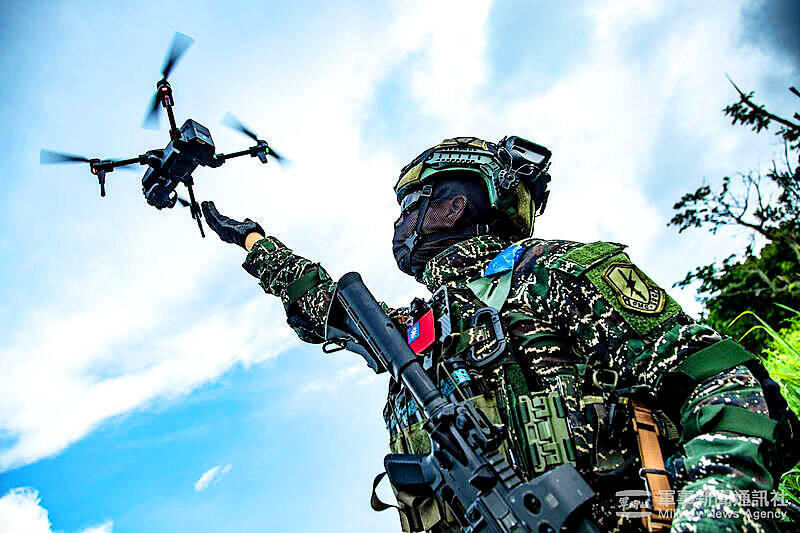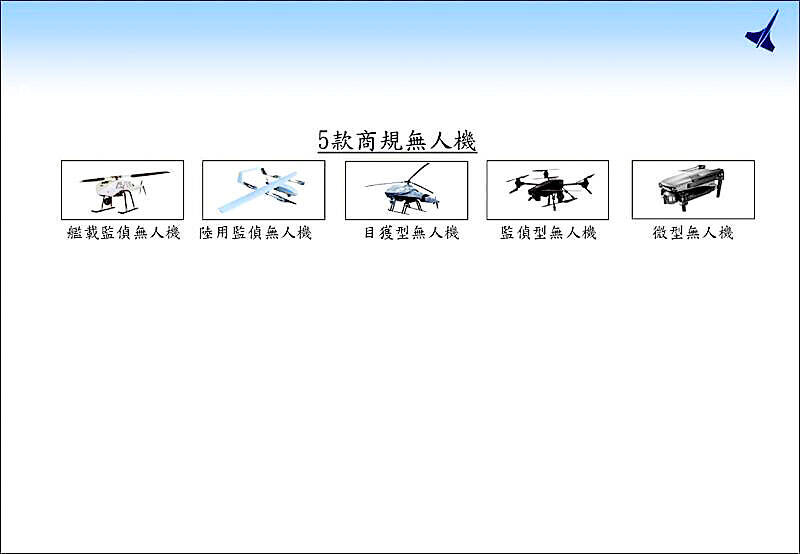The Ministry of National Defense is to acquire an additional 48,750 military-grade commercial uncrewed aerial vehicles (UAVs) over the next two years, an Armaments Bureau notice released on Tuesday on the government’s e-Procurement System showed.
The previous procurement plan is expected to be completed by the end of this year, while the new, independent plan would run through 2027.
The UAV categories in the latest notice are largely in line with those in the previous notice: short and long-range fixed-wing UAVs, rotorcraft UAVs, and vertical takeoff and landing (VTOL) fixed-wing UAVs.

Photo courtesy of the Military News Agency
The bureau’s Material Production and Manufacturing Center has opened solicitations for the five UAV categories, inviting domestic manufacturers to submit models for evaluation.
The five models have been temporarily labeled types A through E, with each given strict technical requirements.
Types A and B are multi-rotor UAVs with 6km and 25km minimum control ranges respectively, the notice said.

Photo courtesy of the Ministry of National Defense
The procurement quantity for type A was 7,500 units next year and 26,500 in 2027, while for Type B it was 1,100 units next year and 3,200 in 2027, it said.
Types C and D are both fixed-wing UAVs, it said.
Type C should have a control range of more than 90km and a minimum flight time of two hours, while Type D should have a control range of at least 30km and at least 30 minutes flight time, the notice said.
The bureau is looking to procure 970 Type C units and 1,350 Type D units next year, and 2,980 Type C units and 4,450 Type D units the following year, it said.
Type E is a VTOL fixed-wing UAV with a control range of more than 100km, a minimum flight time of 2.5 hours, an average cruising speed of more than 80kph and the ability to withstand winds stronger than 5 on the Beaufort scale during takeoff and landing, it said.
Procurement quantities were 350 units per year for next year and 2027.
This latest UAV procurement notice is a significant increase from the ongoing one, which was for just over 3,000 units.
In other news, next year is expected to be the first time the national defense budget would cover four concurrent active special military projects, highlighting the emphasis President William Lai’s (賴清德) administration has put on defense spending.
In addition, the ministry would seek an unspecified special procurement budget for next year, a source said, speaking on condition of anonymity.
The government expects to need hundreds of billions of New Taiwan dollars for arms procurement, as weapons and energy might be bargaining chips in tariff discussions with the US, the source said.
The arms procurement would also go toward Lai’s pledge to push national defense spending to more than 3 percent of GDP, they said.
The ministry has two active special budget programs, the NT$237 billion (US$8.07 billion) Naval-Air Capability Improvements Procurement Project, which began in 2022 and ends next year, and the NT$247 billion Procurement of Updated Fighter Jets Project from 2020 to next year.
Meanwhile, the legislature on July 12 advanced the third reading of the Special Act for Strengthening Economic, Social and National Security Resilience in Response to International Circumstances (因應國際情勢強化經濟社會及國土安全韌性特別條例), which has a budget of NT$115 billion, while the national security resilience budget began this year and runs through 2027.
However, the Executive Yuan and ministries are yet to provide a detailed breakdown of how the national security resilience funding would be distributed each year.
In addition, a second batch of 42 M1A2T Abrams main battle tanks purchased from the US is to arrive at the Port of Taipei late on Saturday, a second source said.
Taiwan has allocated about NT$40.52 billion from 2019 to 2027 to purchase 108 M1A2T tanks from the US with the aim of assigning them to the Sixth Army Corps to defend northern Taiwan.
Additional reporting by CNA

Right-wing political scientist Laura Fernandez on Sunday won Costa Rica’s presidential election by a landslide, after promising to crack down on rising violence linked to the cocaine trade. Fernandez’s nearest rival, economist Alvaro Ramos, conceded defeat as results showed the ruling party far exceeding the threshold of 40 percent needed to avoid a runoff. With 94 percent of polling stations counted, the political heir of outgoing Costa Rican President Rodrigo Chaves had captured 48.3 percent of the vote compared with Ramos’ 33.4 percent, the Supreme Electoral Tribunal said. As soon as the first results were announced, members of Fernandez’s Sovereign People’s Party

MORE RESPONSIBILITY: Draftees would be expected to fight alongside professional soldiers, likely requiring the transformation of some training brigades into combat units The armed forces are to start incorporating new conscripts into combined arms brigades this year to enhance combat readiness, the Executive Yuan’s latest policy report said. The new policy would affect Taiwanese men entering the military for their compulsory service, which was extended to one year under reforms by then-president Tsai Ing-wen (蔡英文) in 2022. The conscripts would be trained to operate machine guns, uncrewed aerial vehicles, anti-tank guided missile launchers and Stinger air defense systems, the report said, adding that the basic training would be lengthened to eight weeks. After basic training, conscripts would be sorted into infantry battalions that would take

EMERGING FIELDS: The Chinese president said that the two countries would explore cooperation in green technology, the digital economy and artificial intelligence Chinese President Xi Jinping (習近平) yesterday called for an “equal and orderly multipolar world” in the face of “unilateral bullying,” in an apparent jab at the US. Xi was speaking during talks in Beijing with Uruguayan President Yamandu Orsi, the first South American leader to visit China since US special forces captured then-Venezuelan president Nicolas Maduro last month — an operation that Beijing condemned as a violation of sovereignty. Orsi follows a slew of leaders to have visited China seeking to boost ties with the world’s second-largest economy to hedge against US President Donald Trump’s increasingly unpredictable administration. “The international situation is fraught

GROWING AMBITIONS: The scale and tempo of the operations show that the Strait has become the core theater for China to expand its security interests, the report said Chinese military aircraft incursions around Taiwan have surged nearly 15-fold over the past five years, according to a report released yesterday by the Democratic Progressive Party’s (DPP) Department of China Affairs. Sorties in the Taiwan Strait were previously irregular, totaling 380 in 2020, but have since evolved into routine operations, the report showed. “This demonstrates that the Taiwan Strait has become both the starting point and testing ground for Beijing’s expansionist ambitions,” it said. Driven by military expansionism, China is systematically pursuing actions aimed at altering the regional “status quo,” the department said, adding that Taiwan represents the most critical link in China’s